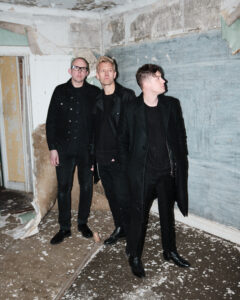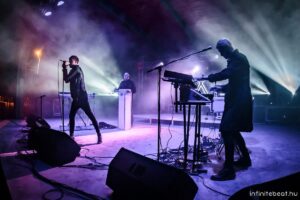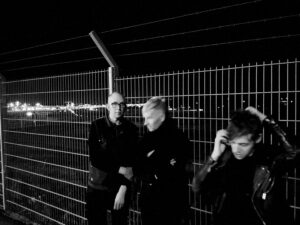Swedish band Agent Side Grinder have recently released Jack Vegas, their second album with Emanuel Åström on vocals, following 2019’s popular A/X. That was a record on which they proved that they could continue without Kristoffer Grip, their first singer. Now, with the trio fully established, they have released one of their best works. We have talked with Johan, Peter and Emanuel about their career and the keys to better understand their latest work.
Cover photo: Haris Mlivic

Photo: Haris Mlivic
—Johan and Peter started the band around 2004, right? Johan had some background in soul and funk as it appeared in an interview, can you please tell us more about this?
—Johan: In my twenties I was really into 70s soul, funk and disco. Also, more modern RnB. I was in several bands back then and one of them, actually still exists and performs occasionally.
—The music of your first 7″ and first album was more industrial. What were your influences back then?
—Peter: I had been listening to early industrial music for a long time, but around 2003 I got very interested in industrial music with a pop feeling, primarily Thomas Leer and Robert Rental and also the Swedish band Njurmännen. When Johan and I started making music together, my industrial experimental sounds and Johan’s skills for melodies got mixed together and I really liked the outcome.
—Your second album is a bit more aggressive, more punk. Did it reflect a moment of your lives?
—Johan: Not really, the band was in a positive mood when recording Irish Recording Tape. We were looking for an authentic sound and wanted to capture the rough energy of our live performances. We laid down the tracks in just two days.
—Why the name Irish Recording Tape?
—Peter: I went into a flea market shop to see if I could find some reel-to-reel tapes. I found this “Irish Recording Tape” box. Instantly I really liked the colour of this item. But when I opened the box, it was not a reel-to-reel tape inside. Instead, it was a roll of super 8 film. The film shows a fast cut of a family moving into a new apartment, celebrating a child’s birthday, going to the beach, and watching Olof Palme speaking in Stockholm. This made some kind of atmosphere for the record.
—Another release with a curious name was Transatlantic Tape Project, although the explanation is that one of you was, at the moment, living in the USA, right? Can you please tell us more about this?
—Peter: The idea to make an album by sending tapes by regular post between Sweden and USA, was an attempt to recreate a working process that Dirk Ivens and Marc Verhaegen used when they did early work with Klinik. They sent tapes to each other to create the music without meeting. I bought two exactly similar cassette porta-studios and sent one to Johan in the US. And also a Yamaha CS-01 and one 707 and some instructions regarding work flow. Then we posted everything to Henrik for the mixing process.

Photo: Infinite Beat
—Although you have talked a lot about it, how was playing with Suicide? The influence of the duo was quite strong in your second album, don’t you think?
—Johan: It was a defining moment for us. I remember hanging out with them after the gig, talking mostly to Martin Rev. We recorded both our concerts and released it as a split cassette, which became a rare item for our fans.
Suicide’s spirit was strong in the early days of ASG. And their influence returned on Jack Vegas.
—How did the change to a more melodic music with Hardware come? New gear or new influences?
—Johan: It was a natural evolution for us. We felt we had the ability to reach beyond the monotone “krauty” stuff on the first two albums. A song like “Mag 7” proved we could do longer, more complex stuff too. And I was always more into strong melodies rather than just jams or drones.
—Was the cover a tribute to Computer World by Kraftwerk?
—Peter: The Hardware album artwork is based on an advertisement for a Swedish home computer in a magazine from 1978. I thought it was funny to make something that really referred to Kraftwerk but actually was before Krafwerk. A time machine experience.
—The band has released several remix albums; how do you select the remixers? Do you prefer remixers who stick to the original song or who change it completely?
—Johan: We have got to know so many talented artists when touring, so we have a big network of potential remixers. But most often, we get requests by the artist himself/herself. I like it when remixers add their personal signatures into the song.
—Alkimia was more post-punk. The band said that modern post punk was a little worn-out at the moment. According to you, why are they so many bands of that style now?
—Johan: It seems the whole post-punk/goth scene has exploded the last few years, which is great. I suspect it has to do with social media and also TV series such as Wednesday and Stranger Things. Since it’s a very “visual” genre, it works well in the digital era. However, I do sometimes lack a bit of originality among all bands. It seems many acts use the same formula when creating music.

Photo: Jeffrey Booze
—How did you experience the big line-up change in 2017? Did you think that the band could be over?
—Johan: No, Peter and I were determined to continue, and we searched intensely after a new singer. But I was a bit afraid the fans would abandon us. I know myself how hard it is to replace a singer; few bands survive such a dramatic change. But luckily, we were one of them.
—And what do you think that the addition of Emanuel added to the sound and spirit of the band?
—Johan: Well, he was a quite different singer from Kristoffer so naturally the sound changed a lot. He also contributed with new, well-needed energy into the band. We got happier and maybe more relaxed with Emanuel on board.
—Do you think that with A/X the band found a more personal sound?
—Emanuel: Not necessarily more personal in a permanent way. But it was an expression that matched where we were at the time. In hindsight, we couldn’t really have made it in any other way.
—The band said that there was a more eighties influence in this album. What do you find interesting in that decade? Do you think that the 80s revival is ever going to end?
—Emanuel: Hmm, that depends on how ‘revival’ is defined. I believe the eighties will continue to have a strong influence on new music. But I hope it’s not only in a nostalgic sense. When we made A/X we were very influenced by the sounds from that time, but we never tried to imitate them.
—Johan, you said that the band doesn’t use a lot of backtracks. Do you think that in electronic music there are too many bands whose live shows are basically backtracks with them playing on them?
— Johan: Yeah, bands rely a lot on backtracks, that’s for sure. I’m not bothered what other bands do, but personally I like the nerve and the tension you get from playing live. For ASG it’s essential to put on a show with lots of equipment and stuff happening on stage.
—I think that it was Kristopher Grip who said it but, you do think that Joseph Beuys and the Dada movement have influenced a lot the work of the band, right? What do you think about that?
—Emanuel: We still talk a lot about Joseph Beuys. Even though he was highly intellectual in his approach to art, the end results were raw and unsettling in a primal way that makes them accessible. In that way he remains an important influence to us.
—For the new album, Jack Vegas, you have looked for a more analogue sound. Why? Do you also think that the album is a bit more complex than the previous works?
—Emanuel: The bigger and more polished sound on A/X worked really well for what we wanted to achieve at the time. But we felt we needed to return to something a bit more organic, something that captured a rawer and “live” kind of sound. When it comes to the music, the arrangements are very carefully layered, so in some sense that’s a complexity that we felt could be counterweighted with a more primitive production. At least to us, that approach helps the final result maintain a rather direct feel.
—You have worked again with Henrik Sunbring, who was a member of the band. What do you think he has brought to the sound of the album?
—Emanuel: We wanted to return to a more direct approach, not hiding behind heavy postproduction but rather letting things be what they are. Henrik is a master when it comes to that. He made all the difference in creating a production that feels up-close and naked.
—And music-wise, do you think that you have managed to put all the sounds of the band in a single album?
—Emanuel: Definitely so. It’s a snapshot of where we were at that time, both as individuals and as a group.
—For Jack Vegas, the band has focused on American culture, especially in the beatnik-era works of Jack Kerouac and William S. Burroughs. What do you find interesting in this period?
—Emanuel: It wasn’t so much the period in itself as the parallels we found between the world at that time and today. It felt like a relevant starting point, and we ended up drawing a lot of inspiration from it.
—Last time we saw you (already playing some songs of the new album) was at Ombra Festival. How was the experience?
—Emanuel: For me personally, Ombra really represents what a contemporary festival should be like. A line-up held together by some kind of mutual sentiment, rather than a specific genre. We really enjoyed playing there, and it felt bad we couldn’t stay longer, but we had to leave for Munich.
—In last DarkMad festival we had three Swedish bands on the same day: Then Comes Silence, Kite and Rein. Do you think that the Swedish scene has grown up in the latest years?
—Emanuel: No, not in the last years. I think our scene has been grown up for a long time, and it makes me happy to see that it’s expanding to the rest of the world.
—What are your plans for the future?
—Emanuel: A big show for our home audience in Stockholm and after that we’ll embark on a European tour. And early next year we do a gothic mini tour in the UK together with Then Comes Silence.



